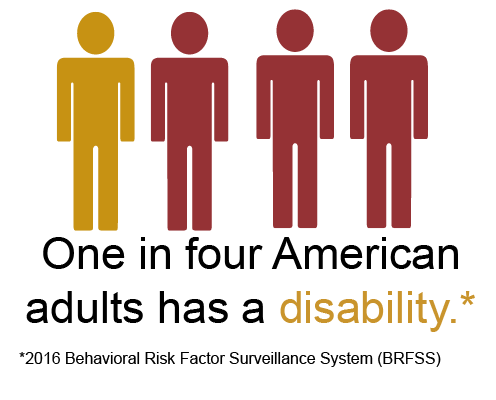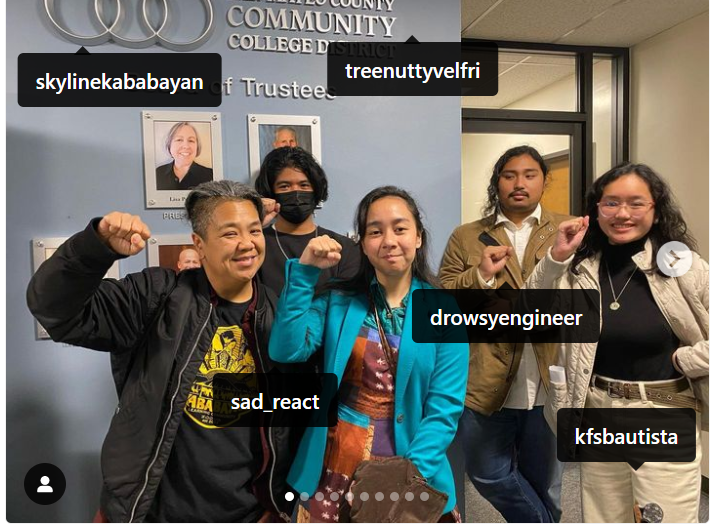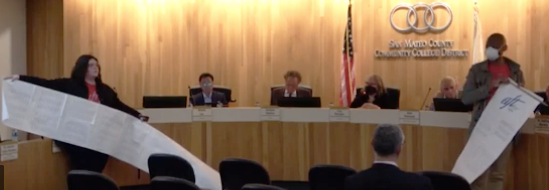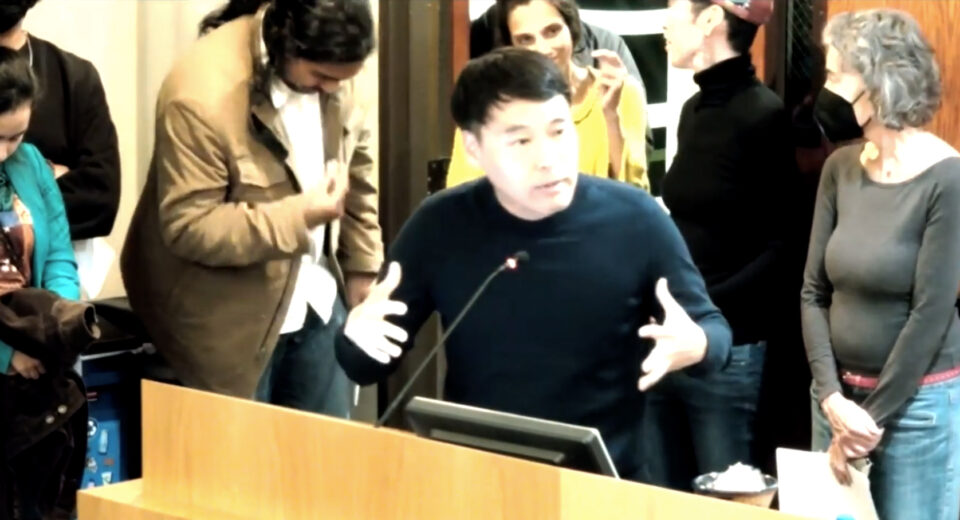May 25, 2023
Dear Board of Trustees and Chancellor Moreno,
Thank you for hearing us out on the topic of class size minimums, Board Policy 6.04, last night. We came out in the middle of finals week because this matter is extremely important to us, faculty and students alike.
This week, Monday through Wednesday, AFT received over 20 written statements on the issue of class minimums, in addition to the faculty and students who made public comments at the board meeting last night, and those who were not given a chance to speak due to the time limit on public comments. Some of these comments are included below (and also as an attachment).
As Board President Pedrides said, there are a number of clear themes that all faculty share, strong concerns in response to the Interim Chancellor’s recommendation to bring the class minimums back to 20. All in all, many faculty have expressed that returning to the class minimum of 20 would endanger many of our programs, as well as many individual courses that students rely on, and would be extremely demoralizing to faculty. The “specific language” as the Chancellor put it last night that supposedly mitigates cancellation of smaller classes, such as the Deans’ ability to consult with faculty, leaves too much room for interpretation by individual deans; this would not be sufficient to protect classes that matter to our students and programs.
Here is a list of critical themes that have been raised by faculty that must be considered
- Our participatory governance is rendered a sham by ignoring the recommendation of DPGC.
- The 20 student limit inhibits student degree completion by canceling stacked classes in levels that typically do not have high enrollment
- The 20 student limit will create distrust of our colleges among our students when classes they registered for are canceled.
- In-person sections will be directly jeopardized by the minimum of 20. They are the life and soul of the campus community.
- Data shows that students enroll in SMCCD classes at the last minute, or even after the semester begins. A minimum of 20 leads to premature cancellation of classes before students fully register.
- Smaller class sizes help students learn and be successful creating a more engaging teaching environment with more opportunities for individualized instruction, particularly helpful for students whose learning suffered during the pandemic.
- Non-required courses and community-serving classes, such as Kinesiology, fitness, and community art, dance and music classes, will be cut under this minimum of 20.
- Some departments may even shut down or lose their grant status due to cancellation of core classes (such as Surgical Tech, Addiction Studies)
- Cancellation impacts our adjunct faculty members who lose needed income due to class cancellation and may decide to teach in another district
Our collective question is: Is this the right timing to increase class minimums from 10 to 20? Is the “fiscal impact” of keeping the minimum of 10 so great, in the context of the “spectacular financial shape” our District is in (as one of the Trustees put it last night), that the District would choose to risk all the above negative impacts expressed by faculty and students?
How you handle this issue is pivotal to the health of our colleges and the confidence and trust our students and community members have in our district.
With much appreciation,
Rika Fabian, AFT 1493 Skyline Chapter Chair, Sociology Faculty at Skyline College
Monica Malamud, AFT 1493 President, Canada College Spanish Faculty
Katharine Harer, AFT Co-VP, Skyline College English Faculty
Faculty Comments
Faculty, College of San Mateo:
“1. It’s very concerning and disturbing that DPGC voted to keep the 10 class min, and the interim chancellor is pushing to override that. It’s concerning, because she’s interim, and thus does not have totally legitimate authority to do so. Also, more importantly, because it renders the whole point and effort of participatory governance, a ruse, a sham. Such a move sends a demoralizing, totally undemocratic and anti-social justice message to our campus community. Top admin need to truly listen to and respect the voices and decisions of our faculty, students and staff. It’s authoritarian not to, plain and simple. That’s not us.
2. In my program, one example illustrating many others, we have core intro classes that fill well, but then we also have more specialized or advanced major-oriented classes, and these sometimes do not fill so well. We need to accommodate the diversity of our courses, and do everything we can to run classes for students, not cancel them. That’s the wrong mindset. We need to respond responsibly to the overall downward trend in enrollment, and we need to “meet our students where they live,” as our district likes to so often put it–by keeping the class minimum at 10. As a basic aid district especially, where enrollment does not drive or even much affect revenue, we should truly fulfill our promise of students first and student success, by keeping classes running best we can–rather than being as “productive” as we can, which usually results in exploiting both faculty and students with classes that are too large. We need to embrace the teaching and learning benefits of smaller classes. We can afford it – everyone knows this.
3. We are not back to the way things were; we’re in a new normal. We’re living with scars; we’re navigating new realities. We’re living in a post-pandemic world, and we need to keep accommodating the post-pandemic struggles and challenges of our students. Keeping smaller classes alive is a vital way to meet this calling.”
Faculty, College of San Mateo:
“My name is Sarah Mangin. I teach English at CSM, and I want to share my perspective on our class minimum and cancellation policies. First I want to thank the board for already showing flexibility on class minimums as a way of serving students in time of need during the pandemic; I want to suggest why that flexibility remains a critical issue of equity and access, in every respect.
With lower class minimums, we prove to our community that we are willing to create a schedule that works for all sorts of students. As an English professor, I see how a higher enrollment threshold cuts out many students from even high-demand courses. When we preemptively cancel a class, sometimes in the middle of summer, without giving it time to fill, we are burning our relationships and breaking trust with students, even after they did everything right by registering early.
On the other end of the spectrum, by preemptively canceling innovative courses for not having enough students, we are systematically excluding marginalized voices and experiences from campus life. That’s exactly what happened to CSM’s course on LGBTQ Literature, which had already demonstrated healthy enrollment numbers along with a partnership with San Mateo’s Pride Center when it was cancelled before the start of the semester, right in the middle of our recruitment campaign.
Yes, we need to be efficient with our resources. But our community outreach and recruitment investments seem like empty gestures to me if we can’t even fulfill our commitment to students who have “shown interest” in our programs by *actually enrolling* in our programs. A lower class minimum and a more reasonable timeline for cancellation are the most direct mechanisms for serving as many students as possible.”
Faculty, Skyline College:
“I’d like to voice my concerns about class sizes – with decreased enrollment it is simply not sustainable to go back to the 20 student requirement, especially for STEM classes, which are what I teach. I usually don’t have issues with enrollment in my classes, however I just check webSMART and I am a bit concerned for the fall.
I know that lots of movement happens over the summer and first few weeks of classes, but my job is on the line if the 20 student minimum were to go back into place. I know my colleagues around all 3 campuses in the STEM departments feel very similar.”
Faculty, Business and Technology, College of San Mateo:
“I coordinate the Vita tax program at CSM where we prepare tax returns under the direction of United Way and the IRS for the benefit of students and members of the public. Pre-covid we had 35 registered in the class. The last two years we have had less than 15 registered. With a requirement of 20, we may not be able to provide tax preparation services for students and the community. This is a major outreach and community service. We prepared 338 tax returns this year and those are students and members of the community who would have had to have paid a minimum of $200 each to have their tax returns prepared elsewhere. It is critical that we be able to continue the program and if the limit is lowered there needs to be a way to approve classes with less than 20 students.”
Faculty, College of San Mateo:
“We would probably have to cancel most of our in-person sections in political science if the class size was 20 instead of 10. Although the online sections consistently fill, it’s hard to get more than a dozen or so students to enroll in face-to-face classes.”
Faculty, College of San Mateo:
“At this time, it’s unrealistic to have a minimum of 20 students for most of our classes. We fall below that, and since I recently accepted the role as the Director of the Addiction Studies program, I have been working hard in the past couple of semesters to revamp the program and recruit. But we’ll need some time to see the success outcomes. I’ve applied and was awarded grants in order to implement the necessary work. And our program has been working diligently to revive and expand. We’ve seen some success so far but still need more time and work to increase our numbers.”
Faculty, Canada College Faculty:
“I would like to send in my strong disagreement with the interim chancellor’s potential move of only allowing 20 or more student enrolled classes to run. I will highlight two critical reasons why this is a bad idea since it directly impacts transfer to advanced degree programs.
1.Transfer programs in engineering (and other STEM programs) require students to take ENGR (or other STEM) classes that by most measures are “advanced” level classes. For example, taking an engineering class requires students to typically complete a large number of pre-requisites. This is the nature of the discipline. This also leads to a natural attrition in the number of students who do take engineering classes but, nevertheless, each class is critical to their transfer success.
Therefore, an arbitrary lower limit of 20 students per class significantly damages the ability for STEM students to successfully obtain their transfer level engineering classes on all our campuses.
2. A second issue that again influences enrollments in engineering and other advanced transfer classes in STEM is the flexibility for students to take classes at their convenience across the various campuses. This lack of a “cohort” model leads to unpredictable variations in semester to semester enrollments in the various STEM classes and is made significantly worse when we cancel classes at the last moment due to arbitrary enrollment number restrictions.
Canceling a higher level class feedbacks into eventually influencing enrollments in lower level classes – i.e. if we dont offer engineering transfer classes, it will lead to fewer students enrolling in math, physics, chemistry and gen ed classes.
So restricting class offerings, especially in specialized disciplines that build off basic classes, is a very easy way to tank future enrollments even faster. I hope this can help administrators understand the critical need to either remove enrollment restrictions or provide flexibility for faculty to decide based on student needs.”
Faculty, at Skyline College:
“I am an Adjunct Professor at Skyline College. For several semesters, my DANC 100 course has met the 10-student minimum, sometimes even a 20-student minimum, however… rarely does the class meet that requirement before classes officially begin. Many, if not a majority, of my students join a week, sometimes two weeks after classes start.
If classes are supposed to meet the 20-student minimum before that time, then my class won’t even get a chance to meet the minimum, let alone exceed. In addition, DANC 100 meets general education and graduation requirements, so cancelling the course before students have a chance to join is not only unfair to me, but also to students who take the course to graduate. I start every semester expecting my classes will run, spending many hours preparing, making adjustments and updates to the materials, and refining assignments. It’s unfair and unjust to expect adjuncts—whose employment is already precarious—to do this work only to cancel their courses without compensation.
For adjuncts like me, this uncertainty is not only financially precarious, but also a drain on my mental wellbeing, causing undue stress before the semester begins. Will my course run? Will it be canceled? How will I make up for that lost income on such short notice? The new proposed minimum is a disservice to the instructors and the students in a time when we’re still all reeling from the effects of the pandemic, which is, despite the end of emergency declarations, still ongoing. To continue to give our students the quality education they deserve and to give instructors the financial stability they deserve (particularly in one of the wealthiest and most expensive areas of the state), the District needs to keep the 10-student minimum.”
Faculty, Skyline College:
“Hello Chancellor, I am writing to voice my concern about having 20 students as minimum one week before the semester starts. I feel this requirement is detrimental to the survival of non-requirement classes that provide physical and mental health for the student population. Thank you for advocating for us.”
Faculty, Canada College:
“I have taught economics full time at Cañada for over 30 years. For 26 of those years (right up until covid) the prevailing wisdom was that in order for students to succeed we needed to build a strong sense of community–on campus. All the studies, we were told, showed student success correlated with community. To that end, we invested in programs like MESA, STEM and student life. We built state of the art learning centers. We remodeled our campus to make it more community centric and we rebuilt our athletic fields and the buildings that house these sports.
We did all that, and more, in the name of community.
It is with this history as a reminder that I would like, with all due respect, to present my thoughts on enrollments.
I have heard fall classes will typically need around 20 students to run. I am not against having a minimum number. However, should the modality (F2F, online, Hybrid) be factored in? The current 20 student enrollment policy treats all courses, regardless of modality, the same.
I ask you, is that what you believe? Are ALL modalities equally effective?
- Is that what the data says?
- Is that what we observed with our eyes when we watched and read the news reports of what 4-year universities and high schools did once covid restrictions were lifted?
- Does it square with all the time, money, energy and hiring we engaged in to build communities on our campuses?
I am not saying that students who truly cannot come to campus should not be served. We can and should serve them. However, we also should be honest with students. We owe them that. And the truth is that the modality often does matter—a lot. The data says on campus face to face teaching, with a flesh and blood community, on average works best. The behaviors of the universities and high schools, post covid, reflect this basic belief.
However, for this to happen campus leaders need to make face to face offerings the norm. This is not going to happen if our policy says you need 20 in a class regardless of modality. If you as leaders, by your own actions and words, do not make face to face offerings the norm we will, in time, cease to be a campus. Our flesh and blood community will expire. If you doubt me, just walk across any of our campuses right now. We often appear on life support.
I will leave you with one last thought. In a few days many of you will attend one or more of the College graduation ceremonies. These ceremonies are lovely. These ceremonies are testament to what our students routinely achieve, despite their many challenges. These ceremonies are, also, face to face. In person. Flesh and blood. I wonder if there isn’t a larger point here? Thanks for listening.”
Faculty, College of San Mateo and Skyline:
“As a dedicated adjunct instructor I count on my assignments and spend a great deal of time updating and adjusting my courses to include current events and culturally significant information. It is incredibly stressful and upsetting to do all of this prep work only to have classes canceled before they have time to fill. Often my classes continue to have requested enrollments into the first week of the semester.
Also, as a solo parent who is a career adjunct, class cancellations can have a devastating impact on my family. For example, in addition to the lost income, if my course load falls below 40% I lose the healthcare reimbursement that makes it possible for me to afford approximate medical care for my young child and myself. From the students perspective, I often hear from students that canceled classes put their ability to graduate and/or transfer to four year colleges in jeopardy. Further, having smaller classes allows instructors to fully implement the anti-racist equitable curricula that is being espoused by the district.”
Faculty, Skyline College:
“I was shocked to see that there is a proposal to eliminate courses with students that are fewer than 10. Unfortunately, this will impact the Central Service Technology program as we have numbers that fluctuate below 10 because of attrition. The proposed change will guarantee that our program (one of the few state programs of its type, along with Surgical Technology) to run the risk of being shut down because of that proposal.
If those programs were to shut down, and instructors had to find work elsewhere, the possibility of those programs opening back up would be extremely difficult (marketplace competition would absorb those faculty members). It would be in our district’s interest not to modify those numbers as it already is not competitive with current marketplace standards. Please note we have to also meet rigorous accreditation standards, with little staffing to do so.
I can assure you that if our courses were canceled and our program was suspended (again), we would more than likely lose what little remaining staff we have along with our accreditation (this has already happened to the anesthesia program). Skyline is barely rebuilding its reputation for our surgical careers program after losing our previous program director, and it would be a shame if it were completely shut down because of BP 6.04.”
Faculty, Skyline College:
We have been doing the mural painting class on Saturdays since we opened up and it has less than 20 students, but we are making huge impacts regardless. Eventually the numbers will go back up, but canceling this course would be terrible for the community and our students. It would also take away the momentum of the projects we have been doing. We talk about HIPS, well, how can we do that without support and the stress of wondering if our classes will be canceled?
This video documentary was shot by a class of 14 students and would have never happened if we had not had the 10 minimum: https://youtu.be/BGjim6Gyqb8. We just completed another mural in South San Francisco about immigration with a class of 11 students.
Faculty, Skyline College:
The ASCCC legislation and advocacy committee is very concerned about the precipitous drop off in enrollment statewide. At last count, enrollment is down by 500,000+ students in California. If we discount dual enrollment students the number is greater. The SMCCD should be doing everything in its power to attract and retain students for all modalities— in person, online, hybrid. As the president of Skyline College, then president Moreno was the first administrator in the district to insist on a return to face-to-face courses (#we’re back 1/3/2022) Despite the covid pandemic and aggressive Delta and omicron variants, in person classes resumed. Reflecting the uncertainty of the time, Enrollments were scant . Course offerings were pared down followed by last minute class cancellations. We need to cultivate and re-grow the trust of our students. They need to rely upon us to navigate challenging times. We need to maintain the class minimum at 10 for our continuing students and those students we hope to attract this Fall.
Skyline College faculty member in Economics:
[With smaller classes], students and their performance are easier to notice. I’m able to see if students are grasping the concepts when doing hands-on simulations and provide faster intervention to correct their mistakes. Students are able to learn faster and deeper which also fosters more class engagement, and interaction, and builds a stronger sense of a learning community. There are more opportunities to engage with me and their classmates.The students are more prepared because they know they could get called on because there are fewer students. It’s harder to “hide” behind a bigger crowd. This also helps out with attendance and student retention because they feel a stronger bond with the class.It is easier to tailor the learning approach to the needs of the class and results in a better learning environment. All of these have helped all of our students learn the material, have better success in class, and move our student community toward their educational goals. Although this benefits all students, I’ve seen a dramatic positive outcome, especially for our first-gen students.
Faculty, Skyline College:
“Hello all. Thank you for the opportunity to speak with you today. I teach physics at Skyline and I serve as an executive committee representative for the Skyline AFT chapter.
I’d like to use my time here to come out against raising the lower threshold on class sizes back to 20. With all due respect, I feel that doing this would run counter to the District’s pledge to serve students.
This District is in an enviable position. Because we are Basic Aid, our funding levels and access to resources are largely decoupled from student enrollment. This means that we are not beholden to a bottom line in the same way that, say, a commercial airline would be. An airline lives and dies by the sheer number (or lack thereof) of human passengers it can get into the seats on its aircraft. But we are not an airline! And this is a wonderful thing because it means that when enrollment is down, we actually have more resources available per student, who then come away with an improved overall learning experience. And when they move on from their time with us they will spread the word about just how amazing our District is!
The second point I’d like to make is that such a high cancellation threshold is effectively a weapon against my dearest part time colleagues. Put simply, it is violent to assign a course to a part timer who is already struggling only to cancel it and take it away. (BTW why are they struggling? Because we still don’t have part time pay parity in this District and our part timers still don’t have a meaningful health benefit!) It is violent to assign a course to a part-timer only to cancel it and take it away. To say nothing of the students who were counting on being able to take that course whose graduation timelines are now thrown into jeopardy.
How exactly does this serve the students we purport to “put first”? How does this support faculty? How is it equitable? How indeed is this helpful at all to anyone?
PLEASE DO THE RIGHT THING. LEAVE THE CLASS CANCELLATION THRESHOLD WHERE IT CURRENTLY IS AT 10. FULL STOP.
Thank you for your attention today.”
Faculty, Skyline College:
We need a clear limit of 10, as the class minimum for courses to stay on the schedule, and not canceled, in the Board Policy, as DPGC has recommended through a unanimous vote.
During our recent enrollment decline and the effects of the pandemic, in-person classes, particularly those that specifically deal with social justice issues, have experienced some difficulty in hitting the number 20 in enrollment. In the Sociology department, the courses: Sociology of Race, and Sociology of Sex and Gender, offered in person, did not reach 20 this semester. But thanks to the temporary, yet clearly stated provision of 10 minimum we had the assurance that these classes would go. Students who seek out these classes, particularly the Sex and Gender class, are primarily female identifying and queer, and many of them have suffered abuse and marginalization from the patriarchal system. And here, I am not using the word abuse in a metaphorical way. This is one of the few classes in the District.that has gender as the central theme and focus of study. Bringing up the minimum to 20, may jeopardize these important in-person classes. These classes need to be protected with a clear policy, rather than relying on “careful consultation with the Dean.”
Lastly, let me quote one of my students’ here:
“The administration should feel ashamed for cutting classes that not only benefit students, but also give visibility to students of color, LGBTQ+ students, & women. Just because only a few of us enroll in these classes, does not mean we are any less valuable, and cutting these classes would be a slap in the face to all students across our district. “
Please, make your board policy match your often repeated talk about the importance of social justice. Thank you.”
Faculty, College of San Mateo:
“As Language Arts faculty who, with two other colleagues have worked successfully to create a thriving, robust Katipunan Learning Community at College of San Mateo, I ask you to consider the importance of maintaining the Board policy of 10 student minimum enrollment.Being in higher education faculty for almost 40 years, my service has always been rooted in serving marginalized, underrepresented groups.
I embody the legacy of my grandparents, Victorina and Silvestre Suguitan, who immigrated from Laoag City, Philippines in 1929—a period in history when the U.S. was still importing “cheap labor”, denying access to them owning property, reneging on its promise to allow them to complete their education, forcing them to struggle to get good jobs.
During this past year, as our students returned to in-person classes, I have experienced how our Filipino students—many now first in a new generation of immigrants to attend college—have benefitted exponentially from the personalized and close care I was able to provide due to the smaller class enrollment. The ongoing collective trauma from the three-year pandemic continues to manifest in mental and emotional stress which requires parallel attention along with supporting our students’ academic thriving and growth.
Therefore, Interim Chancellor Moreno, I ask you to remain true to the often -repeated commitments to continue to advance equity with tangible, successful result here at CSM with the simple act of being an advocate of maintaining a 10-student enrollment minimum for Learning Communities and other programs in service to marginalized communities. Thank you.”
Faculty, College of San Mateo:
“For my borderline students, the personalized attention in small classes has been a game-changer. It has provided them with the opportunity to clarify any confusion, ask questions freely, and receive immediate feedback. This level of engagement fosters a deeper understanding of the subject matter, helps build confidence, and encourages active participation.
Moreover, the personalized attention in a small class is (slowly) addressing the long-standing lack of attention that some students may have experienced these past few years (screen time has not been kind to many folks). Many have felt overlooked, and therefore unable to connect and so are hesitant to ask questions. By contrast, smaller classes, students seem to feel more comfortable and supported, creating an environment conducive to academic growth.
The current small classes at the College of San Mateo provide my Chemistry students with personalized attention that has a profound impact on their academic performance and growth. By addressing individual needs, clarifying concepts, and fostering active engagement, small classes enable borderline students to thrive in ways they may not have previously experienced. The opportunity for personalized attention also fills a gap for students who have long been without the level of support and interaction that small classes offers. Please, for the sake of student success – let us not walk this back, our students deserve so much more.”
Faculty, Cañada College:
If you want to know a person’s intentions, note the outcome of their actions. Or, to put it more poetically, by the fruit shall you know the tree.
Canada college is a sinking ship. That may not be evident to you members of the board of trustees, but to those of us laboring on the lower decks, I assure you, it is more than evident that indeed yes, the ship is sinking, and morale is low.
Your action tonight will prove, to me at least, what kind of leaders you truly are. Whether you are capable of steering the leaking ship to shore, whether you stand on the upper decks and do nothing, or whether indeed you are the ones poking the holes in the side of the ship. I’m not accusing anyone, I’m merely laying out the possibilities of who you could be to us.
The 20 student enrollment minimum was a knife in the heart of the Theatre Arts Department, and a knife in the heart of my personal morale, and I know I am not the only one. And now we all know the game. To offer a course it must be GE / IGETC. But then of course you run into the problem: GE IGETC courses cannot conflict with each other in the schedule. And so we scurry and compete for diminishing enrollment. And the more enrollment diminishes, the more classes we cut, and so we shrink and shrink and shrink, and anyone who’s been paying the slightest attention can see where this is going.
The solution is to create a tantalizing array of specialty courses and offer them in an inspired marketing campaign to as broad a population as possible, including adult learners, retirees and professionals. Immediate injection of energy and inspiration, immediate renewal.
But here’s the rub. I know you’re not going to do that. You’re going to go with the 20 minimum enrollment no matter what the cost, and no matter what good arguments are presented to you here tonight, because that policy is important to you. If preserving small classes were important to you, you would have done so, years ago. But it’s not the 20 minimum enrollment that’s important to you. I have my suspicions as to why that’s true, and I will share it if indeed you go in the direction I strongly suspect you will go. I pray that I’m wrong, but I don’t think I am.
Do what you will. I know that neither I nor my colleagues have any leverage here. But there are very real spiritual consequences for everything we do while we’re here on earth, and cutting small classes out of education is not something I myself would ever want to live with.”






 I have made repeated requests for training and technology support – waiting months, and even years, for administrators to follow through. Meanwhile work demands continue. Without reasonable accommodations, I am still expected to complete contractual obligations in a timely manner. While the District sits they sit on their hands, I have suffered repeated, painful eye infections from strain. I have suffered despair, anguish, and other health issues from their neglect and disregard of my personal and professional well-being.”
I have made repeated requests for training and technology support – waiting months, and even years, for administrators to follow through. Meanwhile work demands continue. Without reasonable accommodations, I am still expected to complete contractual obligations in a timely manner. While the District sits they sit on their hands, I have suffered repeated, painful eye infections from strain. I have suffered despair, anguish, and other health issues from their neglect and disregard of my personal and professional well-being.”


